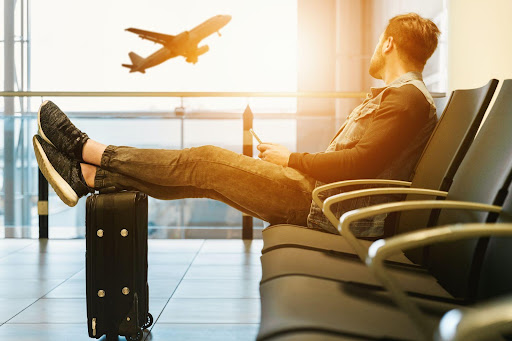Have you ever felt tired, confused, and dehydrated from a long flight that cuts through time zones? That’s jet lag. It is a temporary disorder that comes from long travels across time zones. Symptoms of jet lag can also include mood swings, sleep disruption, stomach problems, and irritability.�
While it’s unavoidable, there are a few things you can do to alleviate the condition and help it end sooner. Here are a few tips you can use to cut down on jet lag.�
- Get Sleep Ahead of Time
Traveling while already sleep-deprived will only make jet lag worse and take longer to heal. To avoid such a situation, ensure that you have enough sleep and rest days before going on your trip. This will help you normalize your circadian rhythm faster after arriving at your destination.�
The less weary your body is, the faster it takes for jet lag to heal. You’ll, therefore, need to have a comfortable sleeping environment with less light. Also, consider an original mattress that provides good comfort and support for your body while asleep since it is harder to sleep while on the plane if you boarded sleep-deprived; catching up ahead of time is a good idea.�
Also read: How to Deal with Jet Lag on Business Trips?
- Gradually Adjust Sleep Schedule
Days before your trip, adjust your sleep schedule according to your new destination’s time zone. Slowly push your sleeping time back or forth by 15-30 minutes every night to get closer to the new time zone. You can also change your sleeping hours by an hour a week before your trip.
Since bodily processes acclimate to new timelines differently for each individual, gradual readjustment will help avoid this struggle. This means that you’ll also be eating your meals closer to the new timelines to help you adjust to the new time zone. Set your watch to the new time zone to make acclimating easier.
- Regulate Light Exposure
Light is among the biggest influences on your body’s circadian rhythm. Controlling light exposure can greatly help adjust to the new location. To teach your body the new timelines, keep things dark when going to sleep. Avoid watching TV or using your phone or computer before bedtime, as this also counts as light exposure.
When you wake up, expose yourself to as much light as possible to help your body think it’s morning time. You can also wear dark glasses, especially if crossing multiple time zones. Varying time zones can be confusing as they make your body mistake evening for morning and vice versa.
- Stay Hydrated
When flying, dry cabin air can be dehydrating. Be sure to drink lots of water before, during, and after landing at your destination. Dehydration makes jet lag signs even worse, if possible, avoid caffeine and alcohol before your flight as they also cause dehydration. The quality of your sleep is lowered by alcohol, and too much caffeine can make you restless.�
Dehydration causes fatigue, increased heart rate, confusion, and low blood pressure. These conditions can make things hard for you, especially on a business trip. If you’re not into drinking a lot of water, try hydrating foods like soups, fruits, and vegetables. You can also try sports drinks to replenish your electrolytes as you hydrate, especially if you have an illness.
- Try to Sleep
Maximize sleep time before departure, even when you’re not feeling tired whenever you’re planning to travel by air. Lie down and let your body adjust to the new nighttime routine like you’re already there. This goes a long way to helping your brain think it’s nighttime. Stick to the new sleep schedule even if you’re struggling with it.
Avoid caffeine and alcohol or reduce usage as they can adversely disrupt your sleep. While traveling, try to choose a comfortable seat, free your feet while seated, or bring a neck pillow to sleep better while en route to your new location.
Stay Jet Lag Free
Jet lag disrupts the circadian rhythm when traveling to a new time zone. Whatever the reason for your travel, you wouldn’t want to arrive feeling fatigued and confused. To make it easier for yourself, schedule some time for sleeping to help your body acclimate to the new destination. Staying hydrated and avoiding exposure to light can also go a long way.
Also Read: Corporate Travel Management tool is best for your Business travel
